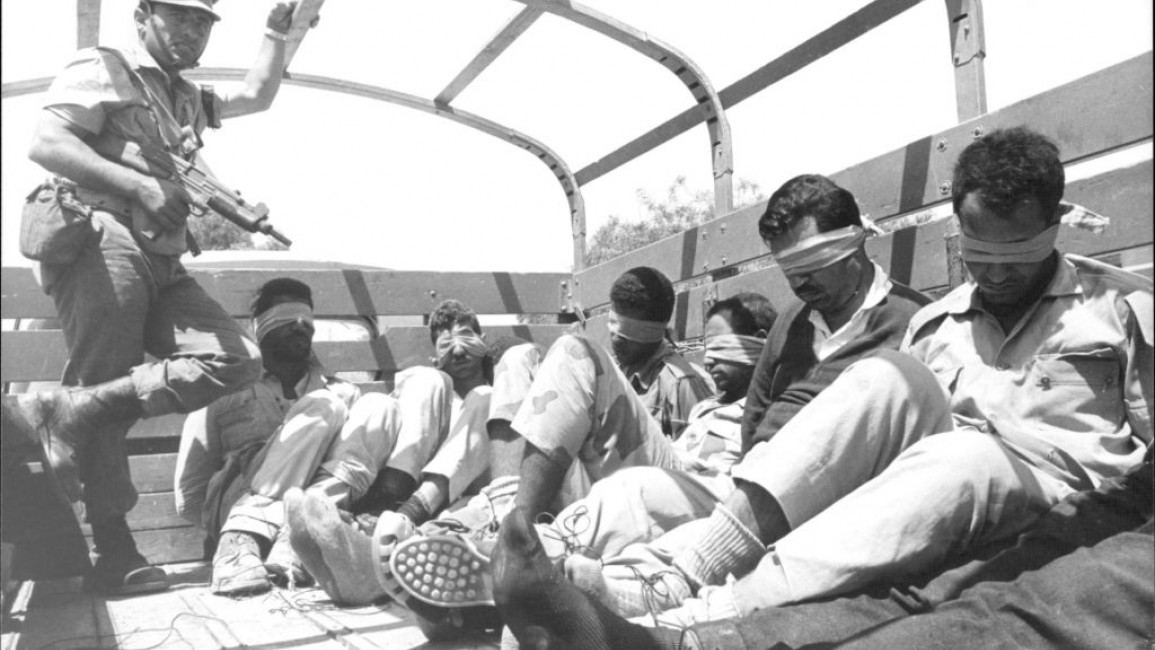Egyptian army vet files lawsuit on Israel over war crimes against 1967 POWs
A former Egyptian soldier named Abdel-Fattah Abdel-Baqi filed a lawsuit before an administrative court against Israel over "war crimes it committed against Egyptian prisoners of war during the 1967 war," according to a high-profile journalist and historian Mohamed El-Shafie.
In the lawsuit, Abdel-Baqi, who currently works as a physician, demanded that the Egyptian foreign ministry take immediate steps against "an enemy" to legally protect national security as well as the morale and rights of the army personnel and their families, El-Shafie noted in a post on his Facebook page.
Recently, Egyptians are in an uproar over the existence of a mass grave in Israel of 80 Egyptian soldiers from the 1967 war unveiled earlier this week by the Israeli media.
The mass grave reportedly contains the remains of an elite unit of Egyptian commandos killed in action on 5 June 1967, known to Egyptians and Arabs as "El-Naksa" ("the setback").
“During the 1967 war, an elite #Egyptian army unit sustained heavy losses west of #Jerusalem. The bodies were interred in a mass grave, in fields tended by Kibbutz Nahshon. The story was hushed up and the fields became part of the Mini Israel park.” https://t.co/iXQTaHT0oB
— Ahmed Saffar (@AhmedSaffar2) July 9, 2022
This week, Israeli newspapers Yedioth Ahronoth and Haaretz revealed that the Egyptian commandos had been killed in an area between Jerusalem and Tel Aviv, and buried under what eventually became a tourist attraction site.
Based on the two papers' accounts, about 20 soldiers of the 80 were burned alive with phosphorus bombs, whereas the rest were killed with explosives and gunshots.
The two newspapers based their discovery on archival data and interviews with residents recounting the horrific details of the fighting.
An Israeli military source who later took an interest in the subject admitted to Haaretz that he was the one who demanded that the story of the mass burial be banned for publication over the years, because its revelation, he said, "was liable to generate a regional furore."
Haaretz further reported that Lt. Col. (res.) Ze'ev Bloch, whom it described as "a walking encyclopedia of the history of the conflict," was present when the soldiers were buried. Bloch served as the regional commander in 1967.
"In 1968, [Bloch] wrote laconically, 'A week after the war I was still finding bodies scattered on the Latrun hills. I was given a backhoe to bury some of them – some were buried by the monks,'" the paper reported.
A source knowledgeable about soldiers ["missing in action"] (MIA) confirmed to Haaretz that the fighters are still buried at the same site.
To the best of his knowledge, the source added to Haaretz, that no request by the Egyptians to return the remains to Egypt has ever been made.
The news of the buried commandos stirred up outrage among several Egyptians on social media platforms.
One Egyptian Twitter user wrote: "ُEgypt seeks immediate clarity from Israel on the 1967 war mass grave that they burned literally...As if they [the Egyptian authorities] didn't know from that very moment it happened. They are not upset except that their scandal has been revealed, no more."
مصر تطلب توضيحات من إسرائيل بشكل عاجل حول وقائع تاريخية بحرب 1967
— دكتور شديد أوي 😉😉 (@DrShdeeddAwy) July 10, 2022
المقبرة الجماعية اللي حرقوها بمعنى أصح ..
قال يعني هما مش عارفين من ساعتها هما مش زعلانين غير أن فضيحتهم أتكشفت مش أكتر ☺️
"Former Israeli army officer Ze’ev Bloch unveiled a massacre against Egyptian troops in 1967. He witnessed [some of them] burned alive, being killed and buried in a mass grave under the control of the occupying forces," tweeted ex-Egyptian judge Waleed Sharaby, who once fought for the independence of the judiciary.
"The least of military honour and loyalty is for the [Egyptian] military command to slam such a crime and insist on retrieving the remains of the martyrs to be buried in Egypt," he added.
زئيف بلوخ جندي سابق في جيش الاحتلال الإسرائيلي كشف عن مجزرة تمت بحق جنود مصريين عام ١٩٦٧وقد شاهد حرقهم أحياءا وأمواتا ودفنهم في مقبرة جماعية واقعة تحت سيطرة الاحتلال
— Waleed Sharaby (@waleedsharaby) July 10, 2022
أدنى درجات الشرف العسكري والوفاء هو إدانة القيادة العسكرية للجريمة والإصرار على إستلام رفات الشهداء ليدفنوا في مصر
"What an achievement! After the tragedy shocked the whole world, Sisi agreed with Lapid that Israel would conduct the investigation into what Israel’s press reported on burning Egyptian soldiers alive and burying them back in 1967," wrote Egyptian Yahia Ghoniem, a surgeon working in the Qatari capital Doha.
"Of course, [Israelis] got scared and wet their trousers," he added, sarcastically.
ياما جاب الغراب لأمه!
— Dr.Yahya Ghoniem (@YahyaGhoniem) July 10, 2022
بعد ماضجت الدنيا بالمأساة:
الزعيم السيسى يتوافق مع لبيد(رئيس الوزراء الإسرائيلى) على أن تقوم إسرائيل ؟
بالتحقيق فيما نشرته الصحافة الإسرائيلية؟
عن حرق جنود مصريين ودفنهم في حرب 67 !
بالتأكيد إسرائيل خافت وابتلت سراويلها. pic.twitter.com/6Xumz2navS
On Sunday, Israeli prime minister Yair Lapid promised Egypt's president Abdel-Fattah El-Sisis during a phone call that his office would open an investigation into the incident.
Lapid assigned his defence minister to "examine the issue thoroughly and update the Egyptian officials."
Egypt's foreign ministry posted a statement on Facebook, seemingly prior to Lapid's call, following the release of the reports, that the Egyptian embassy in Tel Aviv was assigned to communicate with the Israeli authorities "to verify what was published in Israeli media, demand a probe into the authenticity of these articles, and urgently inform the Egyptian authorities of the related details."
An Egyptian writer and historian told The New Arab, on condition of anonymity for security reasons, that "such war crimes may have occurred several times during the numerous wars Egypt entered into with Israel."
"Unfortunately, we mostly know about them through Israeli media. Even if some are known to the Egyptian army, they are never made public to avoid people's fury," he added.



